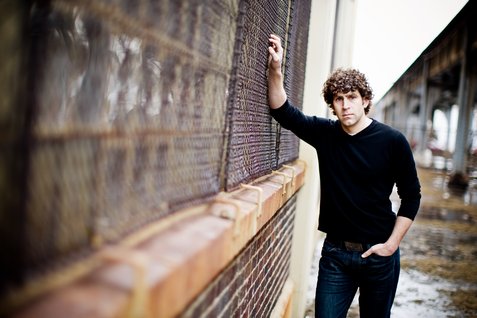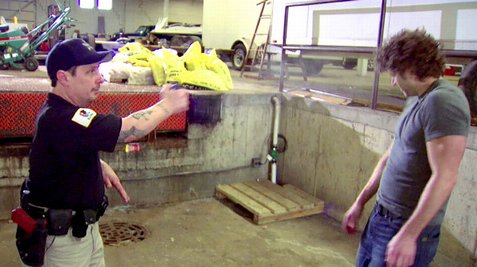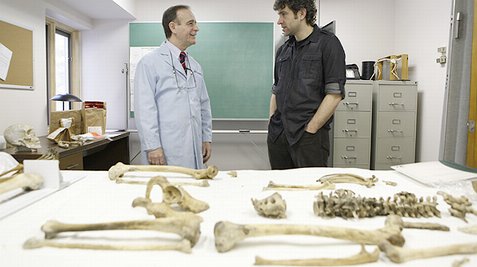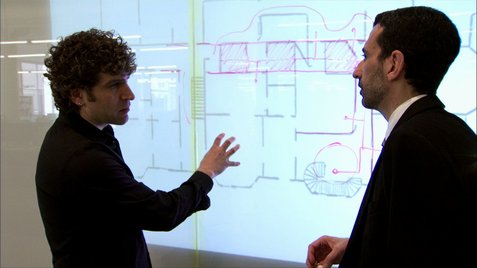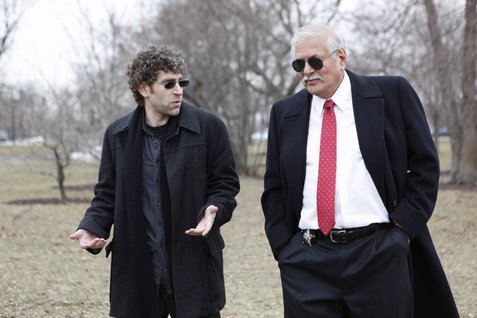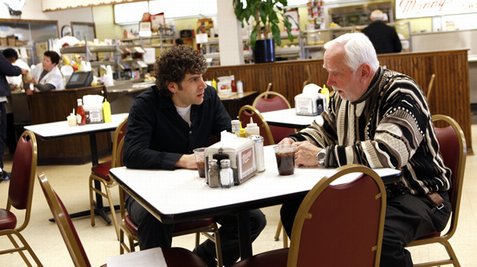The Light from the TV Shows: Exploring “Hidden City with Marcus Sakey”
If Marcus Sakey’s name doesn’t mean anything to you…well, first of all, maybe don’t tell him. He’s a nice guy. I wouldn’t want you to hurt his feelings. But beyond that, it probably means that you need to pick up the pace when it comes to reading top-notch crime thrillers. His debut novel, 2007’s The Blade Itself, was featured as a New York Times Editor’s Pick was named by Esquire as one of the 5 Best Reads of the year, and he’s since enjoyed continued success with subsequent novels Good People, The Amateurs, and The Two Deaths of Daniel Hayes.
But we’re not here to talk about Sakey’s books. We’re here to talk about his TV show.
On December 6, the Travel Channel will debut “Hidden City with Marcus Sakey,” a series that will, over the course of its 12 episodes, explore 12 different cities around the United States – caveat: for these purposes, we’re treating the Florida Keys as one big city – by investigating some of the more sordid (or at least less than cheery) parts of their pasts. For example, in Boston, Sakey explores the history of the Boston Strangler. In Chicago, he looks into the infamous protest riot of 1968. Neither is the sort of thing that’d pop up on the cover of a tourism brochure, but it is the sort of thing that fascinates Sakey. I’ve had a chance to screen the first two episodes of the series, which, not coincidentally, find Sakey working his way through Chicago and Boston, and I found it to be highly enthralling viewing.
Okay, so maybe Sakey doesn’t have the eccentric intensity of, say, James Ellroy. (If you haven’t seen Ellroy’s series “L.A.: City of Demons,” I highly recommend it.) But you can sense Sakey’s fascination with the material he’s discussing and the people with whom he’s conversing, which goes a long way. Plus, c’mon, it’s the guy’s first time playing host. Give him a chance to grow into the role, huh? And, anyway, the end of his adventures in Chicago, one thing’s for sure: he’s up for anything if it’ll help him get a better handle on the discussion at hand…even if it involves being temporarily blinded.
Bullz-Eye: So I checked out both of the episodes on the screener yesterday…
Marcus Sakey: Oh, cool! What did you think?
BE: A lot of fun, to say the least.
MS: Beautiful! Thanks, man, I appreciate it.
BE: In fact, I went on Facebook right after I watched it and said that my eyes were burning just watching the Chicago episode.
MS: [Laughs.] Yeah, I think part of the reason I ended up hosting this was that my friend and producer felt that I was dumb enough to get pepper-sprayed.
BE: It’s a good selling point.
MS: [Laughs.] Yeah. Sometimes not being that smart has its advantages.
BE: So, now, was this series something that was pitched to you to host, or did yourself actually have a hand in creating it?
MS: I co-created with the producer, Tom Cappello, who’s the executive on the show. He actually reached out to me about two years ago to see about doing something like this – I was writing crime novels – and, you know, I joke about the pepper-spray thing, but in truth, it took probably two years of envisioning the show, coming up with the concept, refining it, and pitching it before getting to where we are now.
BE: Given the pitching process, I presume you did a fair amount of research long before it ever got picked up, as far as what cities you were going to cover.
MS: Yeah, exactly. We dug into that. For us, the central idea was a novelist’s point of view on this stuff. You get to look at these crimes and the way they reflect the city’s character. The way that I might, as a novelist, rather than a more journalistic approach. For example, we don’t write anything in advance. I go in with some idea of what to expect, but no real preconceived notions. We’re not trying to jam it into a box. So I’m meeting with these people and doing these things, and that kind of draws out the themes of the city. The themes that come out about the city come out from me actually experiencing it. That’s sort of what I mean about it being the novelist’s approach. Plus, I can do things like trying to guess what’s in people’s heads…which, I gather, journalists are not supposed to do. [Laughs.]
BE: That’s what I hear. So you’ve got 12 episodes in this first season. I’d guess that your original list of possible cities was a bit longer.
MS: Yeah, there’s been a lot of discussion about the cities, and it’s a fun thing to throw back and forth, where we might like to go. It’s sort of a balance. You want to get cities that you think have a broad interest, plus some surprises. So when there’s cities that are very well known, like New York, we try to take an unusual spin on it. For New York, it’s three crimes, all from ’76 to ’78, a very specific time in New York history, when the city was going bankrupt and it was sort of the heart of the “Taxi Driver” New York. We looked at it that way. Then you’ve got something like the Florida Keys, where it’s a whole different approach. It’s just, like, “What does crime even look like in paradise?” [Laughs.]
BE: Like New York, Los Angeles has so much potential subject matter that I’m sure you had to pick and choose your selections carefully.
MS: Yeah, Los Angeles was interesting. There’s no shortage of crime there. [Laughs.] As you know! It was interesting there because we wanted…well, obviously, it’s just not a town you can talk about without talking about image. And yet to me, one of the things that’s most interesting about Los Angeles is this whole myth that Los Angeles is fake. That’s just not true. Los Angeles is very, very real. It just trades in myth and image, and it builds on that. It’s a company town that builds image. So it was fun to look at it in that way. Like The Black Dahlia, who, after her death, was turned into a star in the worst kind of way. The Wonderland murders with John Holmes, that’s the dark side of the dream. You ever seen “Boogie Nights”?
BE: Absolutely.
MS: Yeah, actually, I guess everybody’s seen “Boogie Nights.” [Laughs.] Well, the guy…Burt Reynolds’ character was inspired by a real-life porn director that we got to sit down and drink Scotch with, which was a very interesting conversation. And then there’s the L.A. Riots, which is as real as you get.
BE: I’m actually in the middle of re-reading Helter Skelter, so I had Manson on the mind, but I guess I’m not entirely surprised that those murders didn’t make the final cut, just because they’ve been covered so many times.
MS: Yeah, they have, and…it was under discussion, obviously. It’s hard not to. But for us to pick a crime, it really has to reveal something about the city, and I think the Helter Skelter murders…they do, certainly, but it’s been covered so much and so thoroughly that I don’t think it would’ve revealed anything that people don’t already know.
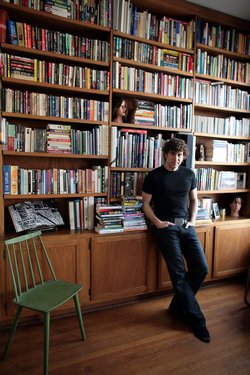
BE: To jump into your writing career for a few minutes, what actually led you to the decision to pursue a career in writing?
MS: Oh, man, I’ve been love with the written word, with stories, literally as long as I can remember. I remember the moment that I learned to read, when the squiggles became a code, and I was, like, “Holy shit, I can see Spot run!” [Laughs.] And, you know, that was it. I was just hooked from that moment on. So I’ve wanted to be a novelist my whole life. The funny thing is, of course, knowing what I wanted to do, I then went and did other things for 15 years first. [Laughs.] But, you know, you need a little seasoning. There aren’t a lot of 18- or 19-year-olds that have something worth saying in a novel.
BE: How did you hone your craft, as it were? Did you study other authors’ work, or did you just kind of keep writing, writing, writing, to see what stuck?
MS: Yeah, it’s a bit of both, y’know? I think, as a writer, your apprenticeship is reading constantly. I’m always amazed when somebody tells me they want to be a writer, and when I ask what they read, they say, “I don’t.” Well, good luck with that. [Laughs.] “I want to be an Olympic gymnast, but I don’t really like the gym that much.” So it’s constantly reading, dissecting what other authors did. I took some classes towards an MFA, but not very many before I dropped out. Mostly it’s writing. The secret that I always tell aspiring writers – and they’re always disappointed – is, “Butt in chair, fingers on keyboard.” That’s how you do it. [Laughs.] Believe me, I wish there was fairy dust, and I wish I had a bag of it. But it doesn’t work that way.
BE: I’ve learned over time that turning off your email and Facebook doesn’t hurt, either.
MS: [Bursts out laughing.] No kidding! I always end up playing a little game with myself. When I’m writing a novel, I have a daily word count that I want to hit, and I just have to set little goals. It’s, like, “Well, when you hit 350 words, you can check your email and Facebook. And then it closes down until 625.” [Laughs.] It’s stupid, but, y’know, you’ve got to reward yourself in these tiny ways.
BE: Obviously, you always knew that you wanted to be a writer, but did you always know that you wanted to write crime thrillers?
MS: No, that I came to later, actually. I always knew that I wanted to write novels, and I wanted to write stories that kept people up too late. Y’know? Things that just riveted you. That’s always been my goal. I was the kid reading under the blankets at night with a flashlight…and I suspect you were as well. [Laughs.]
BE: Oh, yeah.
MS: I wanted to…that was the experience I was shooting for. The thing that got me into crime writing was realizing that it’s a combination of doing that, and then also you can explore real-world issues and philosophical questions and moral dilemmas all turned up to 11. It’s easy to have a principle or to think you know how you might react to something, but climb into a crucible and let’s set it on fire. [Laughs.] Then see what happens.
BE: So back to the show. Is it weird finding yourself on the TV screen?
MS: God, it’s completely surreal. A completely surreal experience, yeah. I was never even an actor or anything. This is not…this is a totally new experience to me. And the thing I’ve done is just kind of try to ignore the cameras and recognize the people I’m talking to. There’s a kind of people who…y’know, you get some access to them when you’re writing a novel, but nothing like this. I mean, we’re talking to people who are absolutely on the front lines of history, who shaped these enormous events. And it makes it easier if I just focus on that and talk to them.
BE: I’d guess it’s almost just as weird to see your name trumpeted in the title of the series. I interviewed Brad Meltzer last year, right before his show started on the History Channel…
MS: Yeah, he’s a nice guy.
BE: He is. But he said the whole thing just became an instant running joke with his family about how ridiculous it was that his name was in the show. He said he’d ask, like, “Honey, what are we having for Brad Meltzer’s Dinner this evening? Because last night we had Brad Meltzer’s Chicken, and I’d love it if we could have Brad Meltzer’s Pasta tonight.”
MS: [Laughs.] Yeah, my wife and I were chatting last night, and she paused the DVR, and…you know how sometimes it catches up to real time and starts playing again? Well, when it did, it cut right in on a commercial with me walking down the streets of Chicago. She paused it again, and she said, “Is everything about you, Marcus?” [Laughs.]
BE: “It is now.”
MS: “Yes, it is, baby. Yes, it is.” [Laughs.] I think it’s really important that people are busting your balls on that kind of thing. My friends all find it hilarious. I can’t ask a question now without them saying…like, if I ask where they want to go for dinner, they say [Quoting the show’s intro] “I’m not a cook. I’m not a restaurant reviewer. I’m a crime novelist.” Yeah, all right, guys, thanks for that…
BE: Which of the cities proved to be the most surprising for you?
MS: Well, there were surprises in all of them. I think the one that was most counter to expectations was the Keys, actually, and mostly because we’re filming in paradise, and we’re thinking, “This is going to be fantastic!” I mean, they’re all stressful and long days and everything, but we’re, like, “This is gonna be great!” But, man, it was FUBAR from the drop. I mean, literally, as we’re trying to fly into the Keys with all of this camera equipment – you’ve got, like, 27 cases – we discover at the airport that, because the runway in the Keys is so short, we can’t do that. We can only bring one bag. So we had to fly everything into Miami and have people drive all night. And it just goes from there. We’re staying on a boat, which sounds nice until you realize it’s 100 degrees and there’s no air conditioning. We interviewed this big, eight-foot-tall actor who plays a pirate, but he kept dropping his shit in the water. The captain of the boat had to keep diving for his saber. [Laughs.] So it was just sort of one thing after the other like that. It was fun. It made for funny stories. But it was totally not what we expected.
BE: Have you found that any of the cities have been a little dodgy after the filming of a particular segment, like, “Are you sure this isn’t going to make us look bad?”
MS: No, there’s been all kinds of cooperation, actually. It’s been really great. It is funny, though: there truly is a different culture to all of these different cities that you see doing this but wouldn’t if you just went to the museums and the shopping districts. Even all those little things…like, in Boston, nobody wanted to be filmed. I mean, not our primary interviews, but other people. Normally, you walk around with a camera and everybody’s, like, waving and flashing gang signs and trying to get on TV. In Boston, nothing. Nobody wanted to be filmed. If they were in the background in the bar, they came up to us and threatened us. They’re a close-mouthed town that doesn’t want to appear on TV. [Laughs.] So the little things like that are kind of interesting. You get the culture of these places. But the cities themselves are often really welcoming.
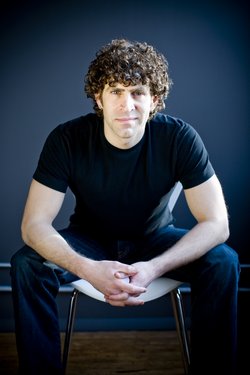
BE: I didn’t know if you might’ve had issues with government officials saying, “Well, we don’t really want to emphasize that particular aspect of our city.”
MS: You know, there are certain groups that will meet with us or something. But the stories we’re picking, there’s always a lot of ways to tell them, so we’ve been fortunate to get really, really close. Funny thing, but…well, again, it’s in Boston, but we were doing the Whitey Bulger story, and that had been planned, but then he got caught a week before we flew there. I was, like, “Goddammit, Whitey, couldn’t you have held out one more week?” [Laughs.] ‘Cause it complicated everything, you know? The FBI suddenly couldn’t talk to us about the case, because it was a pending investigation. But the thing is, because I’m telling this as a storyteller, a novelist, there’s always another angle that we can dig into.
BE: Yeah, plus, now that I’m thinking about it, most of these ages are old enough that at this point the cities are probably, like, “Yeah, we know, it’s part of our history, we’re resigned to it.”
MS: [Laughs.] Exactly. And, I mean, who decides not to go somewhere because someone was murdered there 50 years ago, anyway? Our show isn’t about the lurid side of a city. It’s not, “Find the darkest streets.” But it is about trying to understand a place through its shadows, through things that happened there that, okay, maybe the city isn’t proud of them, but they still really do tell you something about it.
BE: Lastly, what are your expectations for “Hidden City”? There are a ton of reality series out there. What do you think yours brings to the table that others might not?
MS: What I hope it brings is a new way to look at cities where you really kind of come along on this adventure with me. It’s not me telling you how it is. It’s me going to check out how it is, and then reporting back what I find, being very honest and free to have judgments. [Laughs.] And to talk the way I talk. I think we’re wearing out the “bleep” button at Travel Channel! But I think…hopefully what people find is that it’s an adventure they want to come along on.
Related Posts
You can follow us on Twitter and Facebook for content updates. Also, sign up for our email list for weekly updates and check us out on Google+ as well.
Posted in: Entertainment, Interviews, News, Television, Travel
Tags: Boogie Nights, Brad Meltzer, Burt Reynolds, Charles Manson, esquire, Good People, Helter Skelter, Hidden City with Marcus Sakey, history channel, James Ellroy, John Holmes, L.A.: City of Demons, Marcus Sakey, New York Times, Taxi Driver, The Amateurs, The Black Dahlia, The Light from the TV Shows, The Two Deaths of Daniel Hayes, Tom Cappello, Travel Channel, Whitey Bulger, Will Harris, Wonderland

